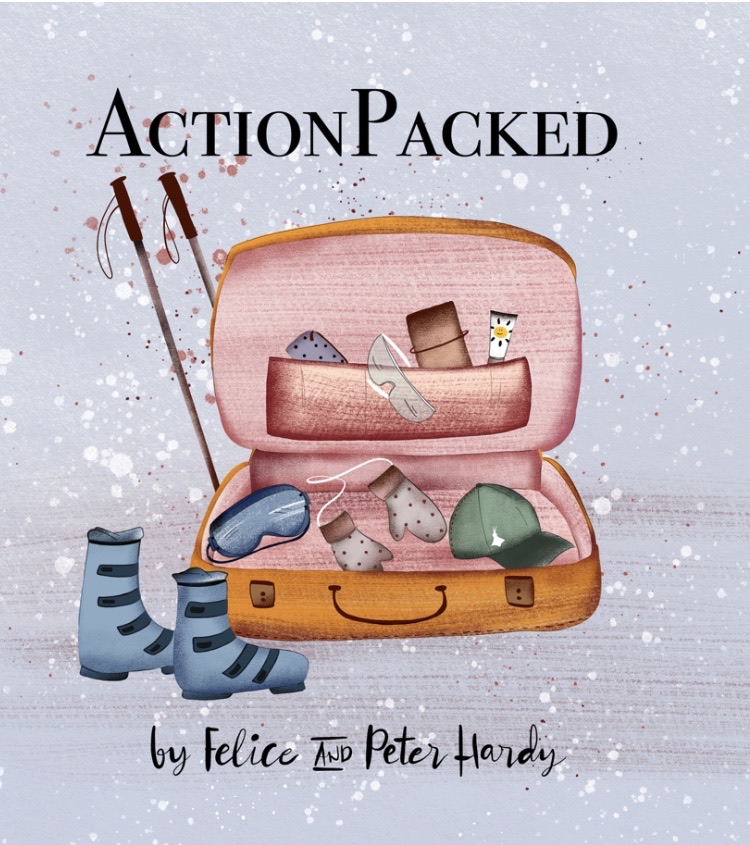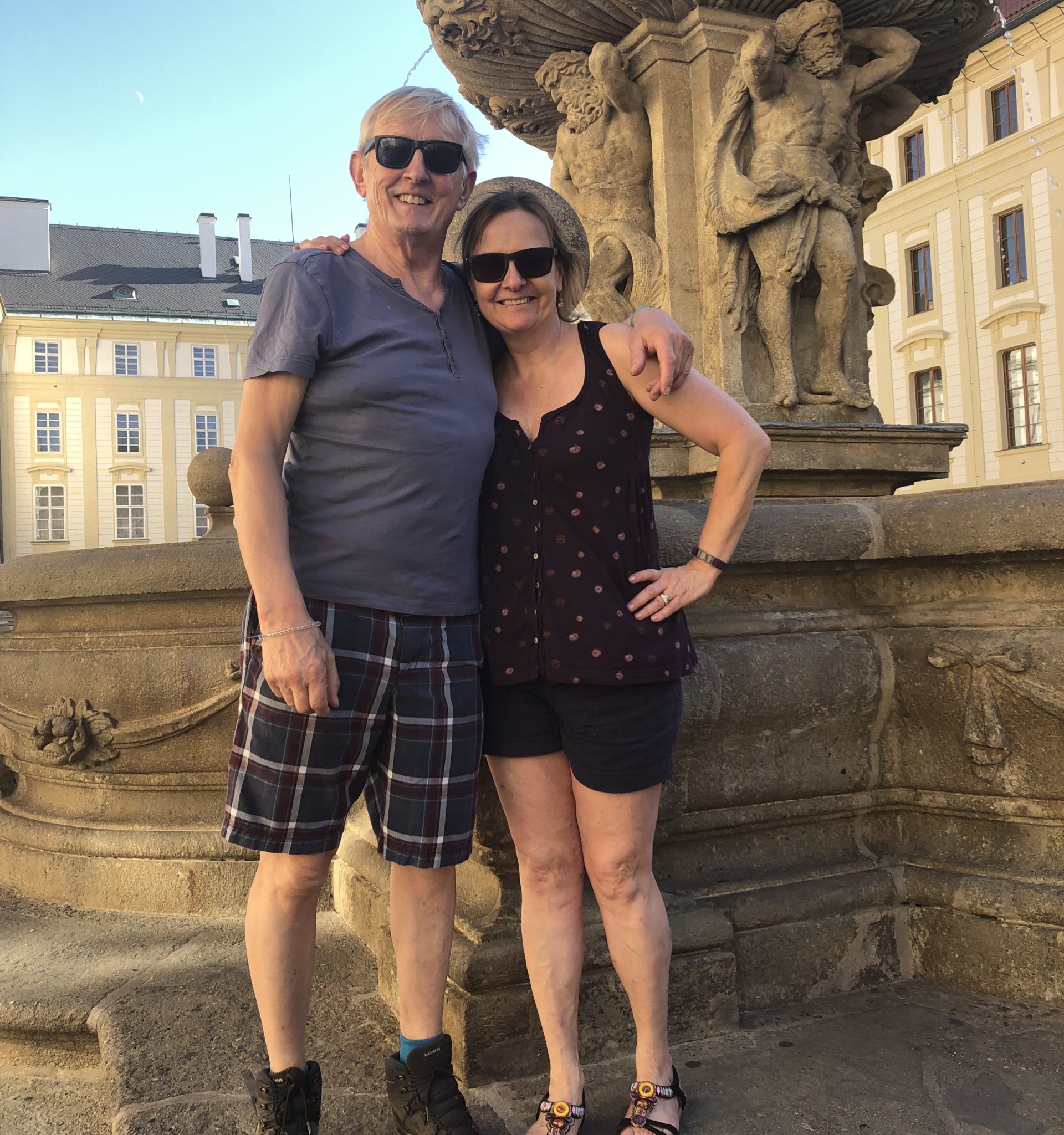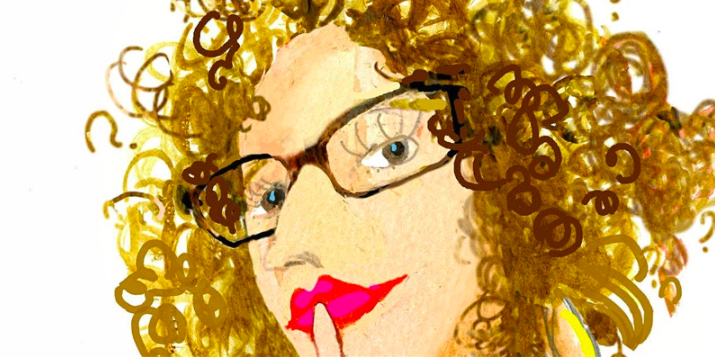
Sudi Pigott describes herself as a discerningly greedy, ever curious journalist with more than 20 years experience writing on food, restaurants and travel.
Felice Hi, Sudi, and welcome to our travel podcast.
Sudi Hi. Lovely to be with you.
Felice First of all, can you tell us how you got into food writing as a career?
Sudi Yes, it was a deliberate accident. At the time, I was working for the British Film Institute on the South Bank and over lunches I got to know a girl who worked for Homes and Gardens magazine at a cafe just along the river. And that made me think about how I’d always really wants to be a journalist. And then I happened to see a course that John Diamond, who was the first husband of Nigella Lawson, was running a one-day course on how to be a food writer. I went along. It was not just food writing, but journalism actually. Others there were doing all sorts of different journalism. And that really inspired me, just made me feel this is what I should be doing. And I kind of launched myself gradually from there, just really having the nerve to write with ideas that appeal. Then I got commissioned quite quickly by some nationals and I became the restaurant critic for Miss London for a long time.
Felice Were you always passionate about food even as a child?
Sudi Yes, I really was. I’ve always been obsessed with food I would say, I used to make proper tea parties for my dolls and soft toys with, like little loaves, bake them cakes. And my mum and my grandma were both very, very good cooks. I mean, we’re Jewish and I think that kind of almost goes with the territory. Food was always central to our lives. My mum would always say: ‘Have you eaten? What did you eat?’ And I had an aunt who had the most incredible collection of cookbooks, and whenever I went there I would spend much of my time immersed in them. And even when I was a teenager and had a Saturday job, I’d take myself out to lunch as well.
Peter Do you travel a lot with your job?
Sudi It is an important part of it, both to meet chefs and to meet producers and to see harvests, to understand the production of anything from gorgonzola to seeing how oysters are farmed and mussels, for example, in Galway and Connemara.
Peter Tell me, Sudi, are celebrity chefs the monsters in the kitchen that they’re made out to be?
Sudi A lot of them were like that, yes. And I would probably get done for libel if I named some of the things and people I’ve heard. I think they’re realising it’s not acceptable and people won’t work there anymore. It’s been more difficult to recruit staff and they realise that if you’re actually reasonable to each other, you get the work done in a more effective and enjoyable way. I think it’s changing, I mean, you’re working under incredible pressure.,I can understand why people do lose their tempers. But the violence and the bullying has to stop.
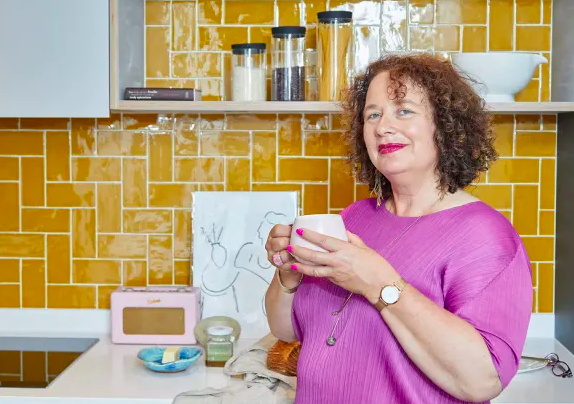
Sudi in her kitchen
Peter Is there one chef who’s influenced your cooking more than any other?
Sudi Well, I think the chef that’s had the greatest influence on me, but I wouldn’t say that necessary my cooking. So I was very fortunate. I met Massimo Bottura before he was really famous and we became friends. I went out to see him and stayed at his home several times. It was full of very cool art and furniture. He took me around to visit lots of his producers, and that’s made a huge impact on me and I just love the way jazz and art is very much in his life and we’re still very much in touch. I just got a message from his wife this morning. But in terms of the food, I go back to my roots. I really love Middle Eastern food, so the Honey and Co people, also Ottolenghi have made a huge impression on me I would say.
Felice I heard you’ve created a database called Women of Food?
Sudi I’m collecting, compiling a database of all the women who run kitchens or restaurants throughout the UK. And I just really, really hope they’ll be able to start them up again. So I’m doing a bit of work on bringing that up to date to a fuller list. I realise I need to have to wait and see what happens. But I’ve always been a big champion of female chefs and feel that they’re not given as much coverage in the media as they should have, and play second fiddle. Really, they need a lot more profile.
Peter I assume you were living in unprecedented times in these weeks of quarantine. Have you managed to stock your larder with all you need for what may be a long period?
Sudi I have done my utmost to do so, yes. But I feel ok about it, because I don’t think I’ve really been stockpiling what everyone else been after. To be honest, it was already pretty well stocked. I’ve got quite a lot of different flours. I’ve struggled to get normal flour because I want to restart my sourdough. But I’ve got chickpea flour, I’ve got teff flour, and I’ve got lots of different quinoa…and malouf which is large Israeli-style couscous, and a good supply of porcini mushrooms that I brought back from Krakow with me. I always bring foods back from my travels as well, and lots of different honeys and spices as well.
Felice Do you have any useful tips for boosting the immune system? Any superfoods that you’d recommend?
Sudi Yes, there are lots, and not necessarily the ones people think of first. Firstly it’s important to have lots of fibres like chickpeas and butterbeans, and things like that are really important, as well as vitamin C is very good. And that’s not found just in citrus – broccoli is a really good source of it, and papaya particularly. And kiwi, though I struggle with kiwi a little bit, And of course chicken soup is probably the best thing you can have. It’s something I often crave. It’s well known as being ‘the Jewish penicillin’, and it has these kind of wondrous restorative qualities. Honey’s very good as well, also antibacterial. I have a very good honey collection: raw honey that hasn’t been processed in any way.
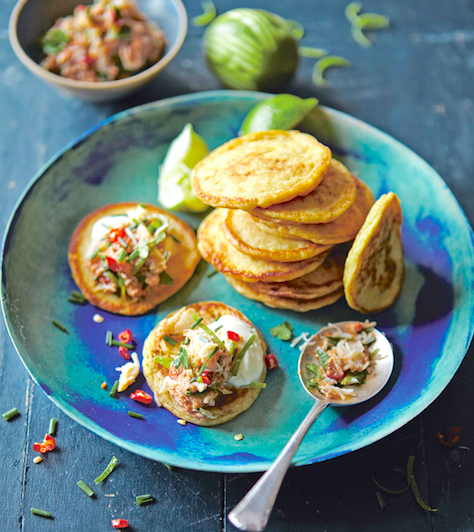
Potato blinis
Felice What about foraging for food? Can people do this safely? Have you done any of this yourself?
Sudi Yes, a lot a few years back in Friuli Venezia there was something called ‘cook it raw’ – it was a big group of chefs going feral really, with Claude Bossi from Bibendum, and Albert Adrià and Massimo Bottura …lots of chefs. And we were kind of going a bit wild in this area close to the Serbian border, and the weather was appalling – it was really, really cold. And basically everything for the meals had to be collected outside, so there was a lot of foraging there. I’ve also been on other courses, so I’m reasonably good at spotting things. It’s always: if in doubt, just don’t do it.
Peter Do you know your mushrooms?
Sudi Some of them, but again, I only if I was absolutely sure. I mean, I have found puffballs and been sure they were puffballs, but anything I wasn’t sure about I wouldn’t eat. You have to be really, really careful. I think if you live by the sea there’s lots and lots of sea vegetables you can forage and eat, and they’re quite easily recognisable. But there are quite a few things that kind of look like something else and you just have to be careful. There are lots of different apps you can download now. Wild garlic is in season now and garlic’s very good for your immune system, so that might be a good place to start. It would be a good way of keeping people away from you as well!
Peter Although you’re not meant to go out and forage at the moment, you’re meant to be staying at home.
Sudi If you know of a field, I mean this is more if you’re out in the country, if you know of a field where they have wild garlic…or forests, you could probably do that whilst keeping your social distance.
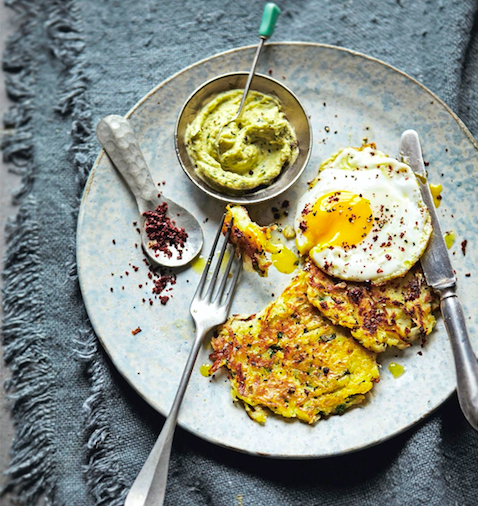
Latkes
Felice I read that you’ve been to both a saffron and a cranberry harvest. Tell us about those?
Sudi Saffron is something that I’ve been obsessed with for many years. I just find it fascinating that something kind of so tiny and insignificant-looking is so valuable. So I was really thrilled when I got the opportunity to go to La Mancha last year. I actually went with one of the women who organises Madrid Fusion and she’s very well connected in the food world. And she knew someone who has a beautiful boutique, more like a jewellers in Madrid, which sells all sorts of saffron products. So the two of us went to see one of his producers – just a few fields produce an enormous amount. This is a family, it’s a third generation, they used to have to carry all the saffron on their backs and it made all their clothes yellow.
Now they have made it a family affair and you have to bend down and pick every single stamen individually by hand. And then they have taken over one of the local halls – well, actually, it’s part of a convent. The saffron strands have to be dried and toasted on something that’s like a really basic sandwich machine, it’s something they fashioned themselves and the mother, the matriarch, does the toasting very carefully, all by eye, then it’s left to dry. It was amazing.
Then we went to a restaurant in a windmill that specialised in saffron foods rather more than normal, in that every course had saffron in it, which was which good fun. It wasn’t the best meal I’ve ever had, but the idea was really fun. And there was even a saffron crème brûlé. It so windy up there and the lady we were with is very slight and petite, and we had to hold on to her. It was that was great.
The cranberry harvest in Boston: again something really, really stuck in. People don’t necessarily know that they grow semi-underwater, a bit like watercress. So we waded out with all the people, the farmers who were collecting it. And they have special kind of rakes for bringing it together. So those whole lakes of cranberries are really amazing. It was also extremely cold and wet, so it was quite challenging. The weather had changed very suddenly and unexpectedly.
Felice Are the lakes red?
Sudi Well, yes, they are. They do look red.
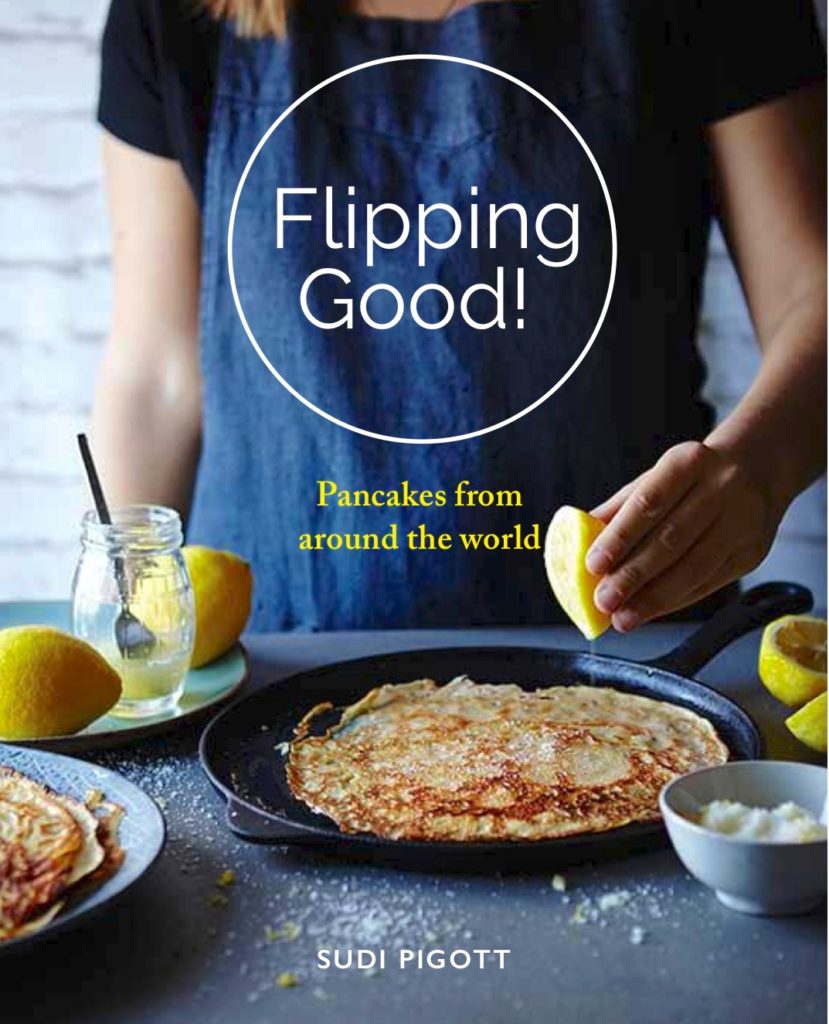
Flipping Good Cover
Peter I know you’re a big fan of street food, particularly in the Far East.
Sudi Well I’ve been to Hong Kong, Singapore which I’ve been to frequently. I’ve been to Singapore quite a lot and there is a huge number of street traders there – hawkers who’ve been doing it for centuries. They probably find the idea that street food is very cool here hilarious, because that’s been that way of life for a very long time and it’s very well known which are the best places to go for particular dishes. So you would go from market to market snd they’re huge – kind of aircraft hangars – for a particular dish like Taiwanese chicken, or seafood dishes, or some kind of dumpling and also there’s quite a lot to street food in Bangkok. I don’t think there’s any point in going to a country and not having the street food. And of course, there’s falafels in Tel Aviv – probably the best falafel in the world.
Peter Is there any food that you really don’t like at all?
Sudi I didn’t like tripe when I’ve tried it, I wouldn’t have that again. Apart from anything else, it’s not to me. Apart from that, I used not to like marmalade at all, but I don’t think I tried really good marmalade. Some friends of mine have a company called Tea Together, and they used to make it on their fermette in northern France near Montreuil. Their son now runs it from a slightly larger place – still very small scale. And that introduced me to marmalade on a different level.
Felice You’re keen on wood-fired cooking as well?
Sudi I love that. Before it became such a thing in London, I’d been to San Sebastian quite a lot. And there’s a small town nearby called Gataria, and that’s really where places like Brat in London got their inspiration.
Felice But your most recent book is called Flipping Good. It’s all about pancakes around the world. Sounds delicious.What was your inspiration for that?
Sudi The kind of warmth and affection that people had for pancakes really. Because whenever you talk pancakes people tend to smile and start reminiscing and thinking about happy occasions with their family. And also, it was partly because I love socca in Nice and wanted to find out more about other less obvious pancakes. Like in Italy they have farinata, and in Japan they have what is more like a kind of omelette-y, cabbage-y kind of pancake called Okonomiyaki and it has a special slightly spicy sauce. I also included pancakes from really everywhere – from the Middle East, Thailand, Turkey, China. I’d like to do a bigger, proper pancake bible, because I was only scratching the surface.
Peter Sudi we look forward to reading that, perhaps in time for Shrove Tuesday next year, you never know. Sudi Pigott, thank you for coming on the show.
Sudi Thank you very much. I really loved being with you.
Felice We’ve learnt lots.
Peter Best of luck with your online course where you can learn how to become a food writer or blogger. Normally you do these in person, but for the moment they’re online. Find out all about these at Sudifoodie.com
Felice That’s all for now. If you’ve enjoyed the show, please share this episode with at least one other person! Do also subscribe on Spotify, i-Tunes, Stitcher, or any of the many podcast providers – where you can give us a rating. You can also find us on Twitter, Facebook and Instagram. Stay safe and we’ll see you next week.
Peter Next week, we’re talking a load of hot-air, chatting to daredevil balloonist Peter Mason, who organised the first flight over Mt. Everest. Meanwhile, stay safe.
Also see Food and Travel with Sarah Barrell
© Action Packed Travel

- Join over a hundred thousand podcasters already using Buzzsprout to get their message out to the world.
- Following the link lets Buzzsprout know we sent you, gets you a $20 Amazon gift card if you sign up for a paid plan, and helps support our show.
LEARN HOW TO BE A FOOD WRITER & WRITE A COOK BOOK
SUDI’S FOOD WRITING WORKSHOP
NOW ON ZOOM
My food & drink quiz
If you spend most of your time thinking about food, writing is a hugely satisfying way to develop your knowledge and passion.
Whether you want to spread your joy and expertise in a particular cuisine or share your own recipes with the world, my food writing workshop 40 minute taster will provide the tools to inspire you.
You may simply love food, work in a food business/ restaurant PR, be an amazing chef with a book bursting to go, this taster workshop gives you an idea of what it really takes.
You’ll leave buzzing with ideas and expert tips.
What the food writing workshop covers:
Develop your own voice
Coming up with irresistible ideas
How to pitch
How to write a book proposal
I will share some anecdotes from my, often culinarily decadent, life with the world’s most talked about chefs, restaurants & food events
email me: [email protected] to register and for more details
